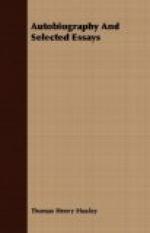[Footnote 96: Maelstroms: a celebrated whirlpool or violent current in the Arctic Ocean, near the western coast of Norway, between the islands of Moskenaso and Mosken, formerly supposed to suck in and destroy everything that approached it at any time, but now known not to be dangerous except under certain conditions. Century Dictionary. Cf. also Poe’s Descent into the Maelstrom.]
[Footnote 97: Milne-Edwards (1800-1885): a French naturalist. His Elements de Zoologie won him a great reputation.]
[Footnote 98: with such qualifications as arises: a typographical error.]
[Footnote 99: De Bary (1831-1888): a German botanist noted especially for his researches in cryptogamic botany.]
[Footnote 100: No Man’s Land: Huxley probably intends no specific geographical reference. The expression is common as a designation of some remote and unfrequented locality.]
[Footnote 101: Kuhne (1837-1900): a German physiologist and professor of science at Amsterdam and Heidelberg.]
[Footnote 102: Debemur morti nos nostraque: Horace—Ars Poetica, line 63.
As forests change their
foliage year by year,
Leaves, that come first,
first tall and disappear;
So antique words die
out, and in their room,
Others spring up, of
vigorous growth and bloom;
Ourselves and all that’s
ours, to death are due,
And why should words
not be mortal too?
Martin’s translation.]
[Footnote 103: peau de chagrin: skin of a wild ass.]
[Footnote 104: Balzac (1799-1850): a celebrated French novelist of the realistic school of fiction.]
[Footnote 105: Barmecide feast: the allusion is to a story in the Arabian Nights in which a member of the Barmecide family places a succession of empty dishes before a beggar, pretending that they contain a rich repast.]
[Footnote 106: modus operandi: method of working.]
[Footnote 107: Martinus Scriblerus: a reference to Memoirs of Martinus Scriblerus written principally by John Arbuthnot, and published in 1741. The purpose of the papers is given by Warburton and Spence in the following extracts quoted from the Preface to the Memoirs of the Extraordinary Life, Works and Discoveries of Martinus Scriblerus in Elwin and Courthope’s edition of Pope’s works, vol. x, p. 273:— “Mr. Pope, Dr. Arbuthnot, and Dr. Swift, in conjunction, formed the project of a satire on the abuses of human learning; and to make it better received, proposed to execute it in the manner of Cervantes (the original author of this species of satire) under a continued narrative of feigned adventures. They had observed that those abuses still kept their ground against all that the ablest and gravest authors could say to discredit them; they concluded, therefore, the force of ridicule was wanting to quicken their disgrace; and ridicule was here in its place, when the abuses had been already detected by sober reasoning; and truth in no danger to suffer by the premature use of so powerful an instrument.”]




